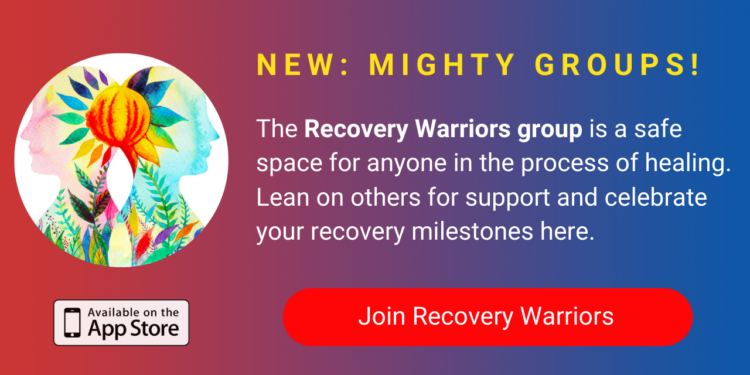I experienced my first major mental health episode when I was seventeen years old. Due to years of trauma, I developed depression and anxiety. My anxiety was so severe I became agoraphobic. If that wasn’t enough, the body image issues that had always lurked in the background flared up. I starved myself, over-exercised and obsessed over my appearance.
In losing my mind I lost my identity in the process. In a mental health assessment, I was asked what I wanted to gain from treatment.
“I want to be who I used to be.”
The nurse gently explained that it isn’t possible. I was furious. What was the point of engaging with treatment if it wasn’t going to work? I burst into tears and the assessment had to be stopped.
My heart was broken. I started to grieve for the girl I once was. The more I thought of her, the less of her I could remember. Although my life had been very difficult, I had never experienced pain like this.
Recovery is a strange word to use in terms of mental health. In any other context, it makes sense. The Oxford English Dictionary defines recovery as:
Recovery (from something) the process of becoming well again after an illness or injury.
Recovery (in something) the process of improving or becoming stronger again.
Recovery (of something) the action or process of getting something back that was lost or stolen.
It’s no wonder I thought recovery was about recovering who I once was. I wanted to feel well, and wellness to me meant being the person I used to be. My lack of understanding of mental health recovery meant I was stuck in a rut for a long time. My goal was unattainable. The girl I grieved for didn’t exist anymore. So I got stuck in a rut and made no movement forward in my recovery journey.
What is “mental health recovery?”
Mental health recovery is split into clinical recovery and personal recovery.
“Clinical recovery is an idea that has emerged from the expertise of mental health professionals, and involves getting rid of symptoms, restoring social functioning, in other words ‘getting back to normal’ [Whereas] Personal recovery is an idea that has emerged from the expertise of people with lived experience of mental illness.'”
– Mike Slade, 2009
I was deemed “clinically recovered.” I was discharged because my symptoms had reduced and I was no longer suicidal. On paper, I looked like a success. But in reality, I was still suffering and my personal recovery hadn’t even begun.
Personal recovery is deeply unique to the individual. It’s about having a quality of life, not just a reduction in symptoms. A widely used definition of personal recovery comes from Anthony (1993):
“…a deeply personal, unique process of changing one’s attitudes, values, feelings, goals, skills, and/or roles. It is a way of living a satisfying, hopeful, and contributing life even within the limitations caused by illness. Recovery involves the development of new meaning and purpose in one’s life as one grows beyond the catastrophic effects of mental illness.”
One of the most interesting things about personal recovery is you can still have symptoms of mental illness. At the beginning of my recovery journey, my view of a “recovered person” was someone who was symptom-free, as well as being the person they used to be before the mental illness.
Who will I be if I’m not the person I used to be?
“If we don’t change, we don’t grow. If we don’t grow, we aren’t really living.” — Gail Sheehy
I was terrified of my future. If recovery wasn’t about recovering the person I used to be, then what would happen to me?
The truth is people change throughout their lives regardless of mental health problems. You can’t be the same person you were at 18 years old when you are 30 years old. Often, we aren’t the same person we were six months ago. Because that’s the nature of life. It’s full of changes and lessons. So in turn we change as we learn.
The Tidal Model of Recovery uses water metaphors to describe how the process of recovery constantly changes. The model is based on the belief that change is inherent in everyone.
“It sees the experience of health and illness as a fluid, rather than a stable phenomenon, and life as a journey undertaken on an ocean of experience.”
Change doesn’t have to be a negative thing. I would remember the old me by looking at her through rose-tinted glasses. It’s no wonder I grieved for her. I was putting her on a pedestal and minimizing any negatives. In reality, the girl I used to be was naive, fragile and had chronically low self-esteem. She was also amongst people who were bad for her mental health. And truthfully, she was deeply unhappy.
She needed to change in order to grow. And she needed to grow in order to be happy.
In hindsight, I think what I grieved for was the things I used to be able to do, rather than who I once was. I missed being able to leave the house, enjoy things, have friends and generally have a quality of life. I didn’t need to go back to being the person I used to be in order to have those things.
At 28 years old, I still haven’t found the girl I used to be. But that’s OK because the woman I am now is far happier and healthier than the girl I spent so long grieving for.
And although she was resistant to the idea of change, if she could see me now I think she would warm to the idea. I can do the things I used to do but with the resilience and self-esteem I never had. And because I have more resilience and higher self-esteem, I am able to do more than the girl I grieved for could ever imagine.
Photo by Joshua Reddekopp on Unsplash


